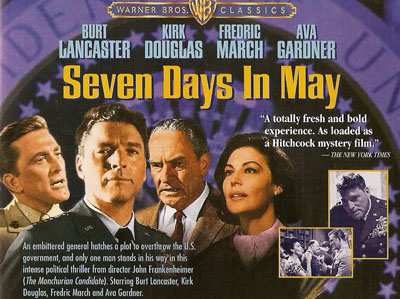If you were a child of the ‘60s, one of the most gripping novels and then movies was Seven Days in May (video link below). The compact plot summary from IMDB is, “United States military leaders plot to overthrow the President because he supports a nuclear disarmament treaty and they fear a Soviet sneak attack.”
If you were trying to relate this plot line to contemporary times, and if you were either a conservative or a “no-matter-what” supporter of Israel, you might think that it could happen again and the president would be Barack Obama. Fortunately, the Joint Chiefs of Staff are in support of the treaty that Obama, Secretary of State John Kerry, and Secretary of Energy Dr. Ernest Moniz negotiated with Iran along with five other allies on the issue (China, France, Germany Russia, United Kingdom). And as the Washington Post just reported, “Dozens of retired general, admirals back Iran nuclear deal.”
When “Seven Days in May” was written, the U.S. President was John F. Kennedy. Some may have disagreed with him on nuclear disarmament, but few questioned his intelligence, his temperament or his psychological stability. Could the same be said about a President Donald Trump?
Trump is just now beginning to flesh out policy statements. To his credit, he has not been hesitant about giving us hints about how he would address foreign policy issues. His campaign slogan is “Make America Great Again.” This is obviously open to interpretation, but Trump has left a trail of bread crumbs indicating that his foreign policy would be guided by threatening to use, or actually using, American military might wherever and whenever he might wish to.
He is opposed to the Iran nuclear agreement along with his hawkish Republican cohorts. He thinks that the United States should demand 24/7 inspection of Iranian nuclear facilities and that Iran must thoroughly disarm immediately, or else. Obviously the key to his policy is what “or else” means. To some it’s an idle talking point, to others it is a negotiating point that must remain flexible, because there are no negotiations without flexibility. And then there is the Trump perspective (theoretically shared by many right-wing conservatives): If Iran does not agree to the Trump demands, then the U.S. should go to war with them and possibly break the 70-year hiatus that the U. S. has had on using nuclear weapons.
Turn your gunnery a few degrees to the left and Trump has his sights on Iraq and Syria. Eschewing all complexities in the troubles there, he wants to take out ISIL. First he plans to take over Iraq’s oil fields. He obviously couldn’t “nuke them to save them,” but nationalizing Iraqi oil fields for the U.S. would involve considerable ground fighting resulting in significant casualties to American soldiers, as well as to the American treasury. Trump would hope that a successful capture of the oil fields by the U.S. would result in a surrender by ISIL, but obviously there is no such assurance. He has already said that he will do whatever is necessary to “wipe them out,” so once again it brings the nuclear option into play.
Trump also wants to “man down” Vladimir Putin in Russia. This means the cold war would heat up again. Putin may be less stable than any previous Soviet/Russian leader since World War II, so all bets are off as to what would happen in a ramped-up conflict.
Trump doesn’t like China devaluing its currency, which would make its products even cheaper in the United States. Is Trump forgetting how much U.S. debt China holds? Is Trump’s solution to the monetary problems between the U.S. and China to go to war with China in order to force them to accede to U.S. demands?
If Trump would take the United States into any one of these expeditions, how would the American military react? Would they say, “Yes sir, we’re here to follow whatever orders you give us,” or might they think that their job is to serve and protect, and if they would serve a President Trump they would not be protecting the American people, much less the citizens of the world.
The “Seven Days in May” scenario just might come into play with a President Trump. Regardless of how many billions of dollars represent his net worth, and regardless of how much taxpayer money he might throw at these follies, he would likely lose the confidence and support of the military – in a big way and in a quick way.
Progressives are often leery of the military, but in the case of a President Trump, the military just might be our best friend.
Trailer from “Seven Days in May”
